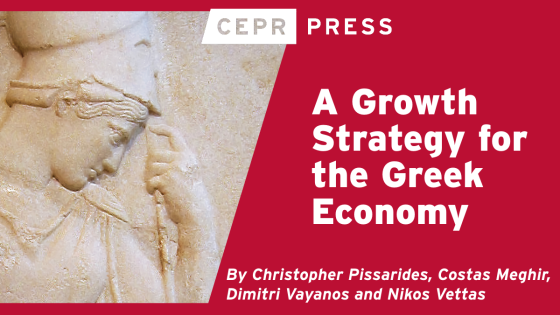Greece is heading for another showdown with its creditors over the next two months. With a major bond payment due in early July, expect another round of arguments on the need for structural reforms of the economy from the one side and the necessity of debt relief from the other (including some vague promises on both). Rest assured that the creditors’ preferred background tune – ‘Grexit’ – will also be playing this summer, though less loudly than on previous occasions, given Europe’s need to cooperate with the country over the refugee crisis.
Greece’s fundamental problem with monetary unions: Past and present
What makes membership of Europe’s economic and monetary union (EMU) so difficult for Greece? And are there ways to improve the antagonistic relationship between the country and its creditors, not least to avoid the annual summer drama with its destabilising consequences for the Greek economy?
Studying the first century of modern Greek monetary history, from the foundation of the National Bank of Greece in 1841 to WWII, can help give an answer to both questions, as parallels between this period and the present are striking: repeated cycles of entry into and exit from the dominant fixed exchange rate system of the day; government debt built-up and default; and financial supervision by West European countries.
During the global reign of gold (1870s-1936), for example, Greece adhered to gold only for three short spells (1885, 1910-1914 and 1928-1932), it defaulted twice (1893 and 1932) and was twice subject to a financial supervision arrangement (the International Financial Control agreement of 1898 and the League of Nations loan-cum-conditionality agreement of 1928).
The main problem was, not unlike today, balancing the budget. Rather than reforming taxation, persistent budget deficits were either monetised or financed through international bond markets. Both strategies came at a price. Strong reliance on seigniorage meant fiscal policy was inconsistent with the gold standard paradigm (the ‘gold rule’ of Bordo and Kydland 1995), undermining the objective of exchange rate stabilisation. Greece suffered from fiscal dominance (a monetary policy subjugated to the treasury’s demands) similar to Italy (Fratianni and Spinelli 2001), but on a different scale – my recent calculations show that Greece monetised on average twice as much government debt as Italy (measured against GDP and excluding war periods; time period for Italy: 1862-1937) (Morys 2016).
Financing deficits through bond issuance also had its pitfalls, as the scarcity of domestic savings implied external dependence (Reinhart and Trebesch 2015). High levels of foreign debt eventually resulted in financial supervision, by which creditors effectively took control of fiscal policy, either following default (the International Financial Control agreement of 1898) or in a pre-emptive attempt to avoid future debt repudiation (the League of Nations loan-cum-conditionality agreement of 1928).
The role of financial supervision in making monetary union membership work
Financial supervision by the country’s main lenders was not more popular at that time than it is today. Yet ironically, it was precisely the effective delegation of fiscal policy that interrupted the prevailing pattern of fiscal dominance – (modest) budget surpluses began to emerge, allowing the central bank to conduct a rule-based monetary policy and join the gold standard (in 1910 and 1928, respectively).
Granger causality tests (between budget deficit and seigniorage revenue) and money growth accounting estimates show that Greece’s monetary and fiscal policies were systematically different under financial supervision than when operating without such constraint – ‘prudent’ under supervision and ‘lax’ otherwise (simply put). Financial supervision was a blessing in disguise as it enabled the country to achieve its longstanding objective of exchange rate stabilisation.
The 1898-1914 experience of financial supervision is particularly instructive in this context. Cut off from closing budgets by means of seigniorage and capital imports, Greece began collecting existing taxes more efficiently and introducing new ones that were standard practice elsewhere. For example, the predictability of tax revenues increased as a result of improved bureaucratic structure – the difference between estimated taxes at the beginning of the financial year and realised taxes at the end of it fell from 9.2% to 5.9% (of total tax revenue) under financial supervision. Greece introduced inheritance tax and income tax in 1898 and 1910, respectively, following decades of futile purely domestic reform attempts beforehand (Tuncer 2015, chapter 6).
Is the loss of sovereignty a price worth paying for monetary union membership?
There are no clear answers, as political preferences come into play. Yet, analysing the political economy of the past entails important lessons for today, when Greece is confronted with the same question again.
Understanding why most contemporaries would have answered in the affirmative requires analysing why Greece wanted to join the gold standard, the euro of its day. Gold standard membership was sought for a combination of economic and political factors, with political considerations substantially more important than for other European countries. Membership of the gold club before WWI was seen as an important pillar of a much larger modernisation programme; eventually achieving this status in 1910 was celebrated as evidence of how much Greece had matured politically since independence (1832) and how much it had caught up economically with Britain, France and Germany as the leading European economies.
The interwar political rationale for joining the gold standard was no less powerful. Currency stabilisation became closely linked to key political issues such as infrastructure projects, refugee relief (following the Greco-Turkish War of 1919-1922) and political alliances. The early 1920s had demonstrated to the Greek public that the international funds needed in this context would only flow if Greece re-joined the gold standard and allowed foreign oversight of its finances; finding itself between a rock and a hard place, the country begrudgingly accepted the constraints on monetary and fiscal policy that came with financial supervision.
Lessons for today
The long-run record of Greece suggests that lasting monetary union membership can only be achieved if both monetary and fiscal policies are effectively constrained. As domestic institutions have remained weak, this typically meant delegating both sets of policies abroad. In historical perspective, the extensive financial oversight acquired by the IMF, the European Commission and the ECB since the first bailout in 2010, is not an anomaly. It rather corresponds to earlier experiences with the gold standard and can be interpreted as the country-specific way of making monetary union membership work.
A second lesson relates to domestic attitudes towards financial oversight and supervision by Greece’s main lenders. Understandable public resentment against ‘foreign intrusion’ has always been weighed carefully against its potential to secure the long-term political and economic objective of exchange rate stabilisation.
The high drama of summer 2015 – when the Greek electorate first rejected a referendum on the conditions attached to a third bailout, only for the Greek government to agree to more stringent conditions a week later – followed a well-established pattern. If forced to choose, Greece prefers monetary union membership and is willing to accept a high level of foreign interference in its fiscal matters in return. EMU membership enjoys extremely wide acceptance across the political spectrum – any politician openly contemplating the idea of leaving the euro during last year’s turbulent summer was evicted from parliament either by party-internal procedures or in the subsequent elections in September 2015.
This preference is explained by the importance that Greek public opinion has consistently attached to political factors behind monetary union membership. In the case of the euro, the relative weight behind EMU membership of political considerations compared to economic ones has even increased since the beginning of the Greek debt crisis in late 2009, as many of the envisaged economic benefits have vanished (Greece has returned to real GDP levels of 2001 when it joined EMU). While such political motivations are somewhat diffuse by their nature (to remain part of an economically and politically more integrated euro area as an avant-garde group within the EU, or even the euro as a political status symbol), they have created a powerful narrative within Greece to stay within the euro essentially at any economic cost.
The troika has ignored such political factors at its own peril (and Greece’s). In underestimating its own bargaining position vis-à-vis Greece, the troika has all too often acquiesced in diluting structural reforms that would have helped the Greek economy. The first 100 years of modern Greek monetary history show that Greece is able to implement meaningful reform, but they also act as a reminder that external pressure is crucial in unlocking the reform potential. Greece and the troika would do well to remind themselves of the ambitious reform agenda they set themselves in 2010.
References
Bordo, M D, and F E Kydland (1995), “The Gold Standard as a Rule: An Essay in Exploration”, Explorations in Economic History 32: 423-64
Fratianni, M, and F Spinelli (2001), “Fiscal Dominance and Money Growth in Italy: The Long Record”, Explorations in Economic History 38 252-72
Morys, M (2016), “Financial Supervision to Fight Fiscal Dominance? The Gold Standard in Greece and South-East Europe between Economic and Political Objectives and Fiscal Reality, 1841-1939”, University of York Discussion Papers in Economics no. 16/05
Reinhart, C M, and C Trebesch (2015), “The Pitfalls of external Dependence”, NBER Working Paper no. 21664
Tuncer, A C (2015), Sovereign Debt and International Financial Control: The Middle East and the Balkans, 1870-1914, Palgrave Macmillan


